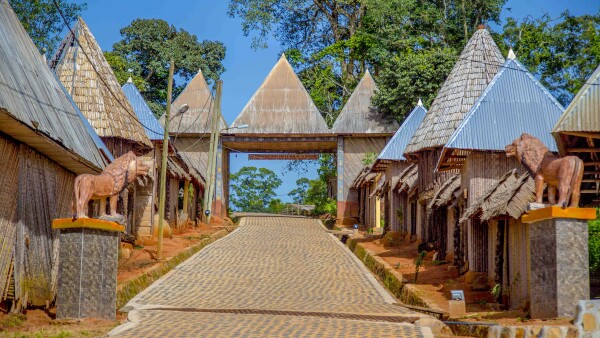ALIPH commits over USD 16 Million for Heritage Support in Africa, Syria, Ukraine, and Gaza

The Foundation Board of ALIPH – the International alliance for the protection of heritage – met recently in Nicosia, at the invitation of the Republic of Cyprus, an ALIPH member since 2023.
During this meeting, presided by Bariza Khiari, Chair of the Foundation Board, 28 new projects, a program to rehabilitate Syrian cultural heritage, and additional funding for Gaza were approved. These decisions mark a commitment of over USD 16 million to safeguard endangered heritage around the world, bringing ALIPH’s total support for cultural heritage protection to nearly USD 116 million since 2018.
Of the 28 newly approved projects, 22 were selected under ALIPH’s sixth call for projects, which focused on protecting cultural heritage threatened by the impacts of climate change. These projects represent a total commitment of USD 9 million. Spanning 26 countries—including 22 in Africa—these will protect built heritage, notably major earthen architecture monuments such as houses built by the Batammariba people, located in Koutammakou (Togo and Benin), as well as museums—notably the Museum of the Sea in Gorée (Senegal)—or collections, like the manuscripts of Chinguetti in Mauritania. Intangible heritage projects are also supported, ranging from safeguarding traditional know-how as a means to strengthen climate resilience—such as on Mozambique Island to protect the traditional “macuti” architecture—to the protection of the sacred forests in Kenya. This call for projects generated strong interest, with nearly 300 applications from 65 countries. For more information about these new projects, please see the factsheet below.
ALIPH also approved a new program for young African professionals engaged in addressing the impact of climate change on heritage, with an initial allocation of USD 100,000 for the 2025–2026 period. Launching in September 2025, it will support early-career heritage professionals and researchers working at the intersection of climate change and cultural heritage—whether through applied research or local community-based heritage conservation projects.
The ALIPH Foundation Board also approved a program to protect Syrian cultural heritage with an initial envelope of USD 5 million for two years. This initiative follows from a mission to Syria in April by ALIPH Executive Director, Valéry Freland, where he visited sites in Damascus, Aleppo, Homs, and the Crac des Chevaliers. He also held in-depth discussions with the Director General of Antiquities and Museums (DGAM), Dr. Anas Zeidan, as well as representatives from NGOs.
This new program will support the protection and restoration of archaeological sites, monuments, historic neighborhoods, and religious buildings; the rehabilitation of museums and their collections; as well as training and exchanges between heritage professionals. ALIPH and the DGAM stand ready to work together on the restoration of the Palmyra collections, the rehabilitation of the museum at the ancient site, and the stabilization of several of its damaged monuments. Palmyra holds symbolic significance for ALIPH, as the destruction inflicted on the site in 2015 was a key event leading to the Foundation’s creation in 2017.
This new program builds on ALIPH’s ongoing commitment to Syria since 2019, where to date it has committed USD 3 million in support of 18 projects, including the rehabilitation of the Raqqa Museum and its collections, and emergency interventions in Aleppo and the Crac des Chevaliers following the 2023 earthquake. Through this engagement, ALIPH strives to contribute to making Syria’s rich cultural heritage a lever for the country’s reconstruction, sustainable economic and social development, and dialogue for peace.
ALIPH has continued its efforts to provide emergency protection for heritage during conflicts and disasters. In Ukraine, thanks the European Union’s new support of EUR 500,000, ALIPH will continue to reinforce the protection of museum collections and improve conservation conditions for artifacts stored in shelters in the western part of the country.
In Gaza, ALIPH has topped up the initial USD 1 million funding envelope for emergency measures by an additional USD 500,000. From this envelope, USD 600,000 has already been committed to safeguarding museum collections, stabilizing and protecting heritage and archaeological sites, and training heritage professionals from Gaza and the West Bank. In Sudan, emergency assessments and documentation and inventory operations are underway at the National Museum in Khartoum and the Gazira Museum in Wad Madani. ALIPH also intervened quickly in Lebanon in October 2024, as well as in Yemen and Myanmar.
In addition to these ongoing emergency responses, ALIPH has also approved six new emergency relief projects, amounting to USD 1.1 million.
“With the adoption of these new projects addressing the impact of climate change and conflict, ALIPH is now active in 54 countries through 550 projects, extending its work across the entire African continent, as well as India, Nepal, and Brazil. In just seven years, we have committed USD 116 million to protect endangered cultural heritage. We are also striving to provide even stronger support to communities and local stakeholders, the custodians of sustainable heritage protection. We remain fully mobilized in Ukraine, Gaza, Lebanon, and Sudan, and we hope to swiftly support the efforts of the Directorate-General of Antiquities and Museums of Syria to return its immortal heritage to the Syrian people,” said Bariza Khiari, Chair of the ALIPH Foundation Board.
Main Image: Cameroon, Bambou Axe de vie Chefferie Bapa, 2024 © Association Route Des Chefferies (ARDC)
